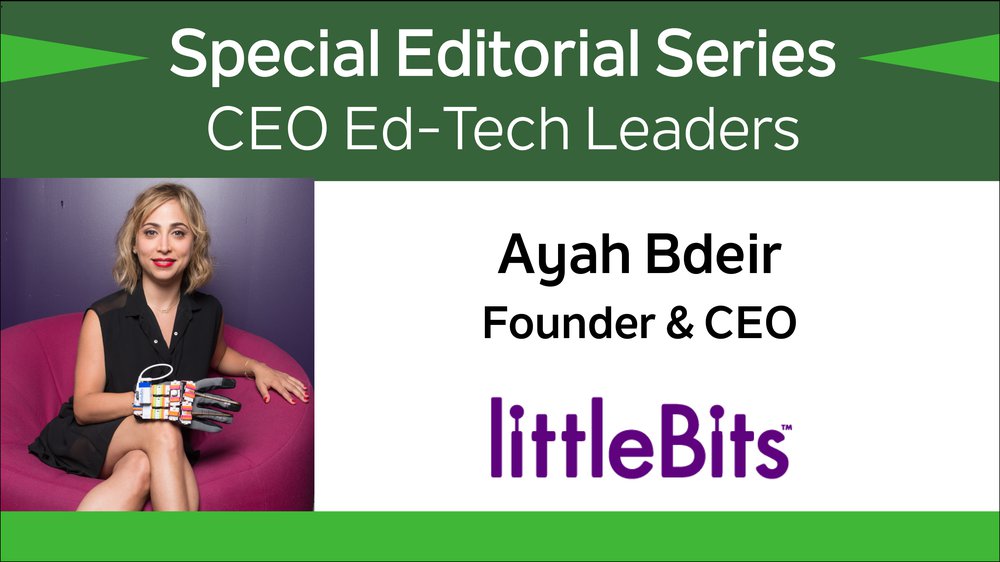Ayah Bdeir is the founder and CEO of littleBits. An engineer and interactive artist, she started the company in 2011. “littleBits has always been committed to empowering kids everywhere, regardless of gender, race, nationality, and ability, to solve the epic challenges ahead. We’re seeing a future where our chief changemakers and problem-solvers are not limited to elite experts.”
Her involvement at all levels of community and government programs earned her substantial recognition. Bdeir’s TED talk: “Building Blocks that Blink, Beep and Teach” gained over one million views. She lectured and advised on how to get more girls into STEM at the White House "Breaking Down Gender Stereotypes" panel, Forbes Under 30 “Closing the Tech Gap,” and at Women in the World with Tina Brown. She earned awards and recognition from Fast Company’s Most Creative People in Business, Business Insider’s 26 Most Powerful Women Engineers, Inc. Magazine’s 35 Under 35, Popular Mechanics’ 25 Makers Who Are Reinventing the American Dream, and Entrepreneur’s 10 Leaders to Watch.
The company attracts an exceptional number of girls into STEAM (science, technology, engineering, art, and math) and consistently over the past four years 35 - 40 percent of the littleBits user base is girls. According to Bdeir, that number is four times the industry average. “Ever since littleBits launched, we have always been laser-focused on the design of our Bits. It was important to me that they were gender-neutral. From the color of our circuit boards to our packaging, each of our products has been deliberately designed to appeal to both girls and boys. This level of accessibility helps everyone to unleash creativity and to instill a love of STEAM through the cycle of inventing.”
“To that end, we also package our Bits in brightly-colored boxes that showcase inventions that appeal to both boys and girls – things like bubble blowers or night lights. Our circuit boards are white (in the early days, I painted traditional green circuit boards with whiteout) and our Bits are candy-colored.”
Bdeir is passionate and enthusiastic about littleBits’ mission: to democratize hardware by empowering everyone to create inventions, large and small, with their platform of easy-to-use electronic building blocks. She takes any opportunity she can to connect with like-minded communities -- maker community, STEM community, girls’ empowerment community, entrepreneurial community -- to create synergy. “I’ve learned so much from being a part of these communities. Namely, the best way to be a good community builder is to be a good community contributor.”
littleBits recently partnered with the National PTA as part of its STEM + Families program, focusing on engaging entire families in STEM experiences at school, at home, and in the community to support students’ success in STEM. The goal of the initiative is to spark an interest in STEM education, inspire families and communities to explore STEM education and career opportunities, and engage family members in shared learning experiences. “It’s so important for kids to take the lead in their educational outcomes. They are interested in what they are interested in, and one way to enhance their knowledge and capacity for information is to meet them where they are at. However, parents and teachers are equally responsible for helping to solve this challenge.”
“The way that kids learn is changing, and littleBits is reinventing learning through play. We’ve always been committed to attracting kids with myriad interests and abilities into STEAM fields. But today, too many parents are forced to cobble together apps, tutors, coaches, camps, and afterschool programs to fill in the widening gap between what future jobs require and what our current education system offers -- proving the need for new curriculum and new ways to garner STEAM knowledge,” explains Bdeir. “littleBits wants to help make the rigor of standards-aligned STEAM learning fun and accessible so that every student is empowered to be an inventor. But we realize budgets are tight. That’s why we’ve introduced a Classroom Grant Program, which allows schools that have never before used littleBits to give it a try.”
With the purchase of three Education Kits, any school is granted an additional three kits at no cost. “We’re making it easier than ever for educators to bring play into the classroom. We know that learning through play is one of the most effective ways to get more kids into STEAM. It helps kids to gain the STEAM skills required for them to be successful in the future of work.”
The company focuses on reaching kids where they already have interest. In that way, their creativity comes to life. For example, ten-year-old Sky from Southern California is into medicine, so she designed a Medicine Machine that counts the number of pills taken while portioning out water and medicine. Another example is Enxhi, an 18-year-old from Gjakova, Kosovo who loves fashion. She designed a wearable electronic skirt that lights up using littleBits. Then there is an 11-year-old inventor named Vedant, from Danvers, Massachusetts, who exclaimed, “My imagination can be real now!” He had figured out a way to control his Lego cars with a remote control he built using littleBits.
Bdeir picked a few of her favorite inspirational examples of students creating and making a difference in someone’s life. A helmet that helps the visually impaired, and a backpack that protects bikers at night and helps prevent accidents.
At first, littleBits focused on the consumer market, but then educators discovered how the electronic building blocks enhanced their curriculum. According to Bdeir, they quickly moved into the education space in parallel. “It’s energizing to see the impact we’re having in classrooms, libraries, and makerspaces around the world.”
The company currently works with more than 20,000 schools, and earlier this year littleBits announced a partnership with education publishing giant, Pearson, to include extra interactivity into Pearson’s STEM/STEAM curriculum. Pearson plans to incorporate littleBits into its grade three to eight science curriculum in the form of “Pearson littleBits STEM Invention Toolbox.”
“Education is a huge focus for us, and we are very committed to it. Our team is constantly visiting teachers, creating programs for teachers and students to improve our offerings and help educators with their very difficult task of preparing students for the future,” concludes Bdeir.











